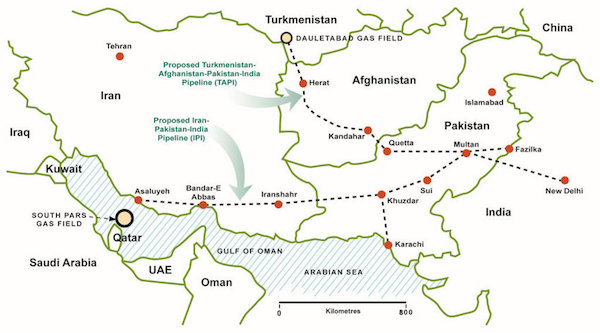Turkmenistan, Afghanistan, Pakistan and India (TAPI) gas Pipeline has once again become significant because of the emerging socio-economic, geopolitical and geostrategic developments in the region. Re-imposition of US sanctions on Iran has debarred other countries not to trade with Iran, escalating tensions between the Gulf Corporation Council (GCC) and Iran and above all economic meltdown has forced government of Pakistan to take all possible measures for the early completion of the TAPI. Moreover, failure in discoveries of energy resources in the drilled wheels in the country has once again projected the completion of TAPI as an alternative source of energy to fill the gap between demand and supply. Subsequently, series of high level meetings have been hosted in Islamabad and Ashgabat for its smooth sailing.
Technical Information
Turkmenistan, Afghanistan, Pakistan and India (TAPI) gas Pipeline has once again become significant because of the emerging socio-economic, geopolitical and geostrategic developments in the region. Re-imposition of US sanctions on Iran has debarred other countries not to trade with Iran, escalating tensions between the Gulf Corporation Council (GCC) and Iran and above all economic meltdown has forced government of Pakistan to take all possible measures for the early completion of the TAPI. Moreover, failure in discoveries of energy resources in the drilled wheels in the country has once again projected the completion of TAPI as an alternative source of energy to fill the gap between demand and supply. Subsequently, series of high level meetings have been hosted in Islamabad and Ashgabat for its smooth sailing.
Technical Information
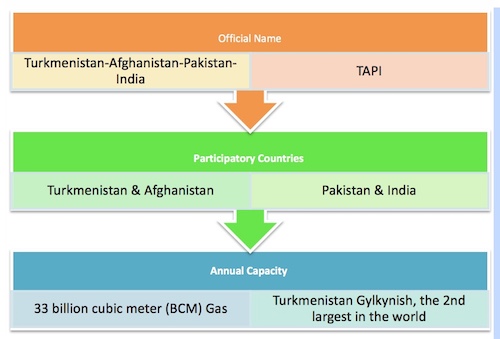
TAPI: A Trans-Country Natural Gas Pipeline
TAPI is a trans-country natural gas pipeline which multiplier effects in terms of regional peace, prosperity and progress. It is a gift from resources of gas. It is a mega project of regional connectivity as ancient “Silk Route” in the past. It connects countries and economies as well. It has become new silk route of regional energy connectivity. TAPI is an energy corridor which has become gate-way to sustainable development in the region. It will promote, support, and facilitate greater economic integration in the region. In the economic liberalization arena, energy seems to be centre point as more energy means more socio-economic prosperity, regional connectivity, massive industrialization and job creation and TAPI is capable of achieving socio-economic wonders.
TAPI: A noble Concept of “Shared Prosperity
Greater regional connectivity through the noble concept of “shared prosperity” is being carried out in the world through different mega projects/ regional corporations/ economic corridors in different continents. Turkmenistan, Afghanistan, Pakistan, India (TAPI) is the prime example of regional energy corridors in Asian continent.
TAPI: Game & Fate Changer
TAPI gas pipeline is a game and fate changer for all the participating countries. It will enhance energy as well as food security in the region. TAPI 1814 Kilometer has now entered into new phase after arriving in Afghanistan. The gas pipe will link the regions of Central Asia and South Asia and transport up to 33 bcm of natural gas. Turkmen gas will help cover the growing need for blue fuel in India and Pakistan, where by 2030 the energy needs could jump up by half. The pipeline will also reduce the constant shortage of energy resources in transit Afghanistan as well.
Currently, the Turkmen section of the gas pipeline has been laid in line with the schedule. The pipeline will run from Galkynysh the largest gas field in Turkmenistan through the Afghan cities of Herat and Kandahar and finally reach the Fazilka settlement located near the India-Pakistan border. It is hoped that final agreement of its actual operationalization and channelization would be inked in October 2019 in Pakistan.
TAPI: Dream Gas Pipeline
TAPI the dream gas pipeline has a strategic importance, utility, productivity and durability to achieve greater regional peace and prosperity in the days to come. It would provide crucial inputs to achieve a stable and sustainable growth patterns for all the participatory countries. TAPI would boast the regional economies and open up unlimited avenues of prosperity. It would be win-win situation for all the four countries. The construction of the Turkmen section of the TAPI was launched in December 2015.
TAPI: Joint & Giant Effort
It will be a joint-giant effort in linking the energy-deficit economies of South Asia to the hydrocarbon-rich Central Asian countries. It will provide cheaper and environment-friendly energy to consumers. It will generate incomes/ revenues that can be used for developing the social sectors especially schooling, medication, clean water and housing. It is expected that it would generate more than 10,0000 new jobs alone in Pakistan.
| Countries | Proportion of Length |
| Turkmenistan | 214 kilometers |
| Afghanistan | 774 kilometers |
| Pakistan | 826 kilometers |
| Total: | 1,814 kilometers |
TAPI & China
TAPI is gradually inching towards its completion which has encouraged other regional countries like China to join it. Most recently, China has formally approached the Pakistani authorities and submitted a proposal for a China-Turkmenistan Pipeline (CTP) that is to cross several Central Asian mountain ranges. According to managing director of Inter State Gas Systems (ISGS) of Pakistan, the CTP would be cheaper and easier for China to build from Pakistan’s territory to cross the Karakoram Range to its western border. Chinese government proposal will be conveyed to Turkmenistan accordingly.
TAPI & Host Country Agreement
Pakistan is likely to sign the host country agreement in the near future to allow formally the laying and passing of the TAPI gas pipeline through its territory and facilitating India to connect it near the Fazilka district. Prime Minister Imran Khan is expected to inaugurate the 780km-long portion of the TAPI project. In this regard, a high profile delegation from Turkmenistan has already visited Pakistan to finalize the details of the TAPI.
The signing ceremony has been delayed since December 2017 in Pakistan. Though the outgoing PML-N led government once planned to sign the agreement and get the civil work launched during May, it couldn’t do so after the quarters concerned left the same on interim or next elected government.
Pakistan’s Persuasion
Pakistan has completed the entire preparatory works (survey, mapping, soil tests, land acquisition etc.) required ahead of launching the civil work for laying the said pipeline.
The TAPI pipeline had to begin in the first quarter of 2019 and the project would be completed in two and a half years. Moreover, Afghanistan and Pakistan have given sovereign guarantees to ensure the pipeline’s security.
The chief executive officer and chairman of the board of TAPI Pipeline Company Ltd, Turkmenistan, Muhammetmyrat Amanov visited Pakistan and assured its timely completion. He said construction work would start in the first quarter of next year. Pipeline would be laid till Pakistan in two years and it would take between six and eight months to lay the pipeline from Pakistan to India. TAPI would create as many as 10,000 jobs. He said the price of gas provided through this pipeline would significantly be lower as compared to the price of liquefied petroleum gas (LPG).
Sharing details about the various financing opportunities and options he said that Asian Development Bank (ADB) and Islamic Corporation for the Insurance of Investment and the Export Credit (ICIEC) had confirmed $500 million and $300m respectively, would boost industrialization in the region. He further elaborated that his company had experience of working in Afghanistan and Pakistan, so hopefully there would not be any security issue. Moreover, there was commitment from Afghanistan that it would provide foolproof security to the project. This project showcases the political will of all the participating countries including the United States and China, are supportive of this project. Moreover, Russian, Japanese and American machinery and support is being used in the project.
Talking about the security parameters and arrangement of the TAPI he said there would not be any security issue in Pakistan, adding that Afghanistan had also given assurance to provide security to the pipeline. Meanwhile security authorities have given no objection certificate (NOC) to TAPI which means one of the main hurdles of its inauguration has been removed in the country.
It is estimated that the timely completion of TAPI pipeline project will cater to Pakistan’s growing needs of energy in its domestic and commercial sectors. Moreover, TAPI is not an ordinary pipeline project.
TAPI’s Benefits
It has various benefits. It is cheaper than liquid petroleum gas (LPG), the pipeline project will also ensure regional connectivity between these four countries. It would provide energy as well as food security. The pipeline can prove instrumental in facilitating a unique level of trade and cooperation across the region, while also supporting peace and security among the four participating nations. The pipeline is expected to facilitate a unique level of trade and cooperation across the region, while also supporting peace and security between the four nations. More than 1.5 billion people in Afghanistan, Pakistan and India are expected to benefit from the long-term energy security provided by the project. In addition, the project is expected to boost the revenues of Turkmenistan via the sale of gas. Afghanistan and Pakistan will also receive benefits through transit fees.
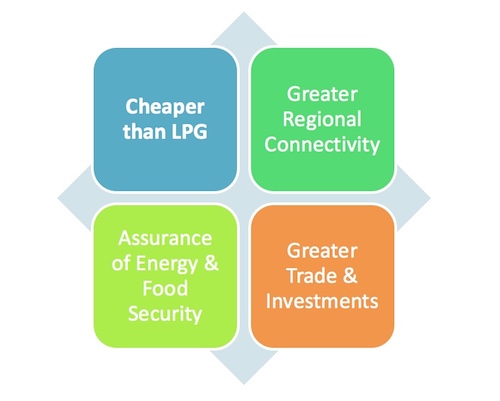
The shaky and unreliable assurance of Taliban, incomplete land acquisition process in Afghanistan (only 45 % has yet been completed in five provinces) provision of financing especially for Pakistan and Chinese version of TAPI should be removed as soon as possible.
TAPI & Innovative Models of Financing
Innovative models of financing (may be assured through transit fee mechanism) and probable cooperation and collaboration with China would bring the desired goals associated with the TAPI. Re-engagement of non-state actors, serious concerns of security agencies, and absence of interstate mechanism of conflict resolution would also be resolved as soon as possible.
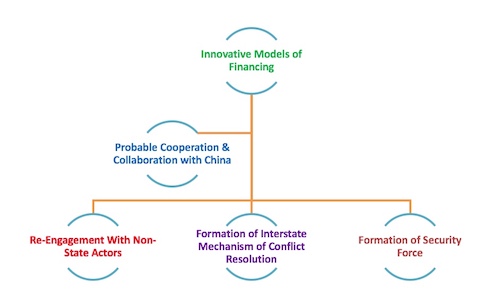
TAPI is a dream gas pipeline which has now come out of the smog screen. Being an expert on Turkmenistan/TAPI it is hoped that TAPI would revolutionize economies, societies and humanities of all the participating countries. It would be a giant step towards massive industrialization in the region. It would start gigantic drive of diversification of resources in the region. It would be the start of a smarter economy.
Administrative Mechanism
TAPI’s Stone-Laying Ceremony
A stone-laying ceremony was held to commemorate the start of construction of the Turkmenistan-Afghanistan section of the pipeline in December 2015 in Mary, Turkmenistan, near the Galkynysh gas field. The ceremony marking the beginning of construction of the Afghanistan-Pakistan section of the pipeline was later held in February 2018. The pipeline has been designed to serve for a 30-year period and is expected to commence operations in 2020. It is slated to transport 33 billion cubic meters (bcm) of natural gas a year.
| Countries | Authority |
| Turkmengaz (majority shareholder) | TAPI Pipeline Company Limited (TPCL) |
| Afghanistan | Afghan Gas Enterprise |
| Pakistan | Interstate Gas Service |
| India | GAIL |
Shareholdings
| Countries | Percentage |
| Turkmenistan | 50 |
| Afghanistan | 5 |
| Pakistan | 5 |
| India | 5 |
| Remaining Shareholding | It will be decided very soon |
Financing Equations
It will connect Central Asia to South East Asia through energy corridor of TAPI. The total price of the TAPI has been reduced to $7 billion from an initial estimate of $10bn and its first stage could cost only $5bn. A final investment decision (FID) is under consideration and may be finalized in the first half of next year. It is hoped that the first gas supply may be delivered to Afghanistan within around a year from the FID and to Pakistan within two years.
| Countries | Percentage |
| Turkmenistan | 85 of estimated cost |
| Afghanistan | 5 |
| Pakistan | 5 |
| India | 5 |
| Other Sources/Countries Interested | Saudi Arabia, China, Japan, ADB, IDB etc. |
TAPI’s Road Shows
The government of Turkmenistan has finalised a plan to conduct road-shows in the UAE, Singapore and London in an effort to raise financing for engineering, procurement and construction phases of the TAPI pipeline project. TAPI Pipeline Company Limited (TPCL) was in talks with several export credit agencies such as Italy’s SACE and France’s Hermes, as well as Greek export credit insurer ECIO. In the near past, Turkmenistan’s President Gurbanguly Berdimuhamedow visited the United Arab Emirates (UAE) and Kuwait in March 2019 to seek financial assistance or investments from these countries.
Potential Financers
Interestingly, Saudi Arabia has shown some interest in financing the TAPI pipeline through the Saudi Development Fund. Even Japan is expected to support the project as soon as the ongoing discussions between Japan and Turkmenistan conclude. Beijing has also emerged as a potential funder, since Turkmenistan is a part of China’s Belt and Road Initiative (BRI), and China is also the largest buyer of Turkmen gas. This would help China extend BRI to India’s western borders, as the functioning of TAPI would mean more connectivity and linkages between Central Asia and India. China’s close links with Pakistan, Afghanistan, and Turkmenistan would help it extend BRI to Pakistan, where the China-Pakistan Economic Corridor (CPEC) is gathering pace.
Basic Salient Features of TAPI
| Basic Features | Details |
| Productivity Line | 30 Years |
| Supply Chains | 33 billion cubic meters (bcm) |
| Supply Share | |
| Afghanistan | 16 % |
| Pakistan | 42% |
| India | 42% |
TAPI: Biggest Energy Project
The TAPI gas pipeline is undeniably one of the biggest energy projects of the Asian region. With a total estimation of $9.9 billion, the project is planned for 30 years. The pipeline would have the capability to supply 33 billion cubic meters (bcm) of gas from the world’s fourth-biggest natural gas reserves in Daulatabad of Turkmenistan with 16 percent going to Afghanistan, Pakistan and India would receive 42 percent each. In addition to receiving 5.22 bcm of gas annually, Afghanistan would get around $400 million each year from transportation income.
The project consists of two phases. In first phase, there will be free flow of gas in the pipeline which will be completed at an estimated cost of $ 5 to 6 billion, while in second phase compressor stations will be stalled at a cost of $ 1.9 to 2 billion.
TAPI and Strategic Importance of Energy
Energy is power. Energy is life. Energy is development. Energy simulates economic and business activities. Furthermore, a cheaper and green energy source i.e. gas creates more comparative advantage than other energy sources (oil, diesel, electricity etc.) Turkmenistan-Afghanistan-Pakistan-India (TAPI) the dream gas pipeline has a strategic importance, utility, productivity and durability to achieve greater regional peace and prosperity in the days to come. It would provide crucial inputs to achieve a stable and sustainable growth patterns for all the participatory countries.
Turkmenistan’s National Energy Policy
Right from its independence, Turkmenistan has been open and helpful to provide alternative source of energy mainly gas to China, Russia, Iran and many other countries. TAPI is the brain child of Turkmenistan which wished to further diversify its export-orientation in terms of oil & gas. It took more than twenty years to finalize but thanks God at last it has now been finalized and formalized.
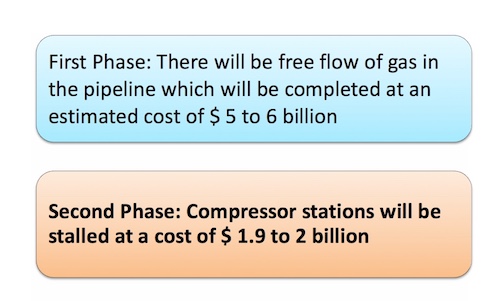
TAPI: A Historical Perspective
Although the pipeline has been under discussion since 1995, it came into the limelight when Turkmenistan, Afghanistan and Pakistan signed a pipeline pact in 2002. India was formally admitted as a member only in 2008. In the last 10 years, TAPI has been one of the main agenda items at every major conference on Afghanistan and also an integral part of the American ‘New Silk Road Strategy’. It is expected that the pipeline could now be operational in the next four years.
TAPI project will have an effect of boosting sustainable development, contributing to social and economic growth and ensuring energy security in the region factors which, in turn, are the ‘backbones’ of the modern architecture of the energy space.
In a relatively short period of time, there was significant progress in the implementation of TAPI project, especially in terms of key agreements, such as the Agreements with the host countries and the Agreement on gas transmission. A strong impetus for promoting the project was given by the consortium TAPI Pipeline Company Ltd and later by the election of the State Concern Turkmengaz as leader of this consortium.
The TAPI project was originally conceived in the 1990s with a view to monetize Turkmenistan’s gas reserves through gas exports via Afghanistan to Pakistan and India. The project will serve to connect the resourceful gas fields of Turkmenistan to energy deficient power economies in the Indian subcontinent by providing steady supply of natural gas to these countries. The project also has the potential to increase the regional co-operation between the participating countries and further promote security and political stability in the region.
In 2002, the governments of Turkmenistan, Afghanistan and Pakistan requested the Asian Development Bank (ADB) to become the Secretariat for a proposed Turkmenistan-Afghanistan-Pakistan (TAP) Natural Gas Pipeline Project. In March 2003, India was invited to join the project. In its secretariat role, ADB has been assisting the government parties with the preparation of relevant studies in order to guide each government’s decision-making process in further developing the project and establishing the project’s legal framework.
TAPI project entered an active phase in 2010, when the Intergovernmental Agreement (IGA) between the four states was signed in Ashgabat. A Gas Pipeline Framework Agreement (GPFA) was also signed by the petroleum ministries of the four countries in December 2010. Moreover, the bilateral gas sale purchase agreement was signed in May 2012. Turkmengaz, Afghan Gas Enterprise, Interstate Gas Service, and GAIL were nominated as shareholders by their respective countries to promote and invest in the pipeline project in 2013.Then, during 2012-2016, the legal framework of the project was successfully supplemented with the Gas Sale-Purchase Agreements with all the buyers, as well as with the agreements on shares and investments.
In 2013, the Governments of Turkmenistan, Afghanistan, Pakistan and India designated the state-owned companies respectively Turkmengaz, Afghan Gas Enterprise (AGE), Interstate Gas Service (ISGS) and GAIL to promote and invest in TAPI project. Additionally, ADB was appointed by the client as the Transaction Advisor (TA) to market the project and attract a suitable client to participate in the Project. In accordance to the transaction advisor’s technical studies the total cost of the project was estimated USD 10 billion.
It will have a diameter of 56 in and a working pressure of approximately 10,000 kilopascals (kPa). The pipeline will initially transport 27bcm of natural gas a year, which will be increased to 33bcm after one year of operation. Compressor stations are also expected to be constructed at different points of the pipeline.
The Afghanistan section of the pipeline is being built along the highway. It crosses the cities of Herat and Kandahar in Afghanistan towards Pakistan. The pipeline will cross the cities of Quetta and Multan in Pakistan towards its final destination, the Indian town of Fazilka, which is located on the Pakistan-India border in the state of Punjab.
The project is being funded by the Asian Development Bank, which is also acting as transaction adviser. The Kingdom of Saudi Arabia, Islamic Development Bank, some GCC Countries, Uzbekistan and even China have shown keen interest to make investments in the said gas pipeline.
UK-based company Penspen was contracted to conduct the technical feasibility studies for the TAPI pipeline. Penspen subcontracted Royal Haskoning DHV to carry out various studies related to the environmental and social safeguard components of the initiative. ILF Consulting Engineers was awarded a contract to conduct the front-end engineering and design (FEED) studies for the pipeline. The scope of the contract also included the provision of technical supervision services for the Afghanistan-Pakistan section of the pipeline network.
Special Assistant to Prime Minister of Pakistan on Petroleum Visit to Turkmenistan
Most recently, a delegation led by Special Assistant to Prime Minister of Pakistan on Petroleum Nadeem Babar departed for Ashgabat to participate in the Turkmenistan-Afghanistan-Pakistan-India (TAPI) gas pipeline meeting. The Pakistani delegation is travelling to Turkmenistan to finalise the plans for the groundbreaking of the project. The TAPI gas pipeline project is expected to be completed by 2022 in Pakistan. Once completed Pakistan is expected to receive 1.320 billion cubic meters (bcm) of natural gas. The TAPI project supported by the United States and the Asian Development Bank (ADB) has been touted by Turkmenistan since the 1990s. But the start of work was delayed because of the problem of crossing Afghanistan.
| Countries | Integrated Economic Dividends |
| Turkmenistan | Energy diversification in term of supplies |
| Afghanistan | $500 million transit fee/Rapid economic development & industrialization |
| Pakistan | $500 million transit fee/ Energy self-reliance, Channels of productivity reactivated |
| India | Immense economic dividends |
TAPI: A Regional Energy Infrastructure Project
TAPI is a regional energy infrastructure project and will help loosen tensions between the neighboring countries involved due to interdependence. This attribute assures that this investment is to bear fruit for all the nations involved in the project. TAPI is a very reliable dimension towards bettering Pakistan-Afghanistan relations and this project can be a way to rebuild Afghanistan into a cohesive nation, a dimension through which Pakistan too will benefit (keeping in mind the implications an instable Afghanistan has over Pakistan). It will also build a sense of trustworthiness among the two countries and will be a factor of interdependence among the nations. The new forming government should take into account the significance and the benefits this project has and should be a priority for the new government since it not only ensures the bettering of multi lateral relations amongst the countries involved, particularly Afghanistan, but also will meet the needs of power shortages in Turkmenistan-Afghanistan-Pakistan-India
TAPI is expected to meet the growing energy needs of South Asia. TAPI gas pipeline project has been described by the participant countries as the ‘Pipeline of Peace’ and a ‘Reflection of Desire’. The implementation of TAPI project will bring Central Asia and South Asia much closer. TAPI can become a best example of growing regional integration process. TAPI can support by providing natural gas for fulfilling the economic development plans and implement clean energy program.
TAPI & Business Opportunities
The TAPI pipeline is also expected to provide new business opportunities for the gas and engineering industries. ADB (Asian Development Bank) is leading stakeholder of the project. Oil and gas firms such as Chevron, Exxon, Gazprom are also part of the project apart from National Oil Companies (NOC) of the participant countries. All the participant countries involved their NOC’s in this project. For example, Gas Authority of India, Interstate Gas System from Pakistan Afghan Gas Enterprise from Afghanistan and Turkmen-Gaz from Turkmenistan formed a joint venture named TAPI Pipeline Company Limited for working jointly in this project. Though, current security conditions in Afghanistan and Pakistan are of concern but intensified contacts on addressing security issues established among the four participants of this project indicate growing partnership and support for TAPI. Physical connectivity and access to energy resources is one of the important elements of the India-Turkmen bilateral partnership and TAPI is a key project in this sphere. At present, the debate on TAPI indicates that TAPI will be successful provided all the stakeholders work together to ensure that negative forces hostile to the success of this project be taken care in an appropriate manner, as any violence or disruption can threaten prosperity of the region that is expected to come through TAPI. Support of local government and cooperation of all the partners are important to address the security challenges as well as ensure technical and commercial viability of the project to make energy available at the low cost to the larger sections of the regional population by the end of 2019.
TAPI: A Win-win Proposition
As TAPI’s success is win-win for all the participant countries, it is expected that the attitude of all the four partners will be to complete this project as fast as possible and make this as a politically and economically viable mission. TAPI dream project is now becoming reality with the political will, positive diplomatic decision and close cooperation.
The TAPI will reopen a historic route that reconnects South Asia to Central Asia in the way it was before the British Empire sealed it off. It will also bring South Asian countries much needed energy at competitive pricing and could easily supply a quarter of Pakistan’s gas needs, about 15 percent of India’s projected needs, as well as Afghanistan’s requirements, by the time it is completed in the 2020s. Energy is a growing need of Pakistan and the proximity and the abundance of Turkmenistan’s reserves make it an attractive proposition. Besides, this pipeline gives this fractured region a reason to work on a project together as well and it is hoped the shared stakes in TAPI’s success will ensure that Pakistan, India and Afghanistan find ways for cooperating on other issues as well.
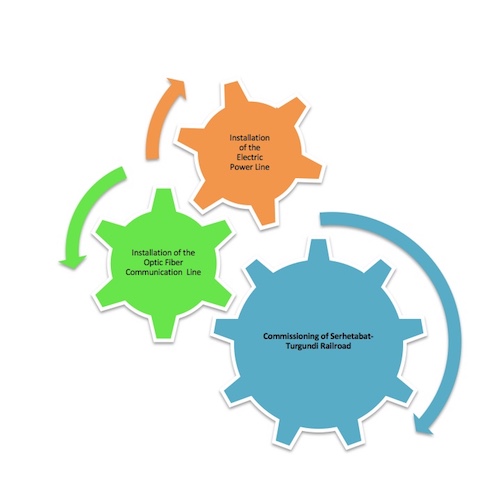
Integrated Significance of TAPI
TAPI is expected to give a strong impetus to the development of economies in the region, will help improve the living conditions of the region’s population and with the construction of a new social and industrial infrastructure, there will be opportunities to create additional jobs. TAPI will contribute to the formation of electricity, transport, communications and social infrastructure gas representing not only energy but also progress.
Electric power & Optic Fibre Communication
Furthermore, the construction of Turkmenistan-Afghanistan-Pakistan-India gas pipeline (TAPI), the installation of the electric power line and optic fibre communication line along the route Turkmenistan-Afghanistan-Pakistan (TAP) and the commissioning of Serhetabat-Turgundi railroad are meant to promote the social and economic development of Afghanistan, its consistent integration into the system of world economic relations, the country’s involvement in regional and international cooperation as an equal partner.
Furthermore, it will reopen a historic route that reconnects South Asia to Central Asia. It will also bring Pakistan and India at competitive pricing. It will provide energy-hungry Pakistan and India to operate their power plants. It will further diversify the fuel basket to the benefit of both the countries and the gas would be used mainly in power, fertiliser and city gas sectors.
Road & Rail Transportation Connectivity
The success of a trans-national Central Asia to Pakistan and India pipeline would certainly spur the expansion of current efforts to create road and rail transportation connectivity between Central Asia and Sub-Continent. With this connectivity, Pakistan would be able to deepen its bilateral economic partnerships with the Central Asian republics and become a major player in the emerging Eurasian regional architecture, creating the possibility of new alliance formations that would help ensure that Central Asia would not become subject to some form of Sino-Russian joint hegemony.
Representatives of the Turkmen, Afghan, Pakistani and Indian governments are working very closely, as TAPI project is extremely important for the development of the region’s economy, primarily for the industrial sector, for large and small businesses. Thus, local contractors will be involved in delivery and construction works. Countries participating in the project will receive a cheaper, more economic and greener energy source as well as additional gas transit revenue.
Implementation of TAPI
The implementation of TAPI project will have a positive impact on the socio-economic development not only of the participating countries but also of the countries in the region as a whole. Turkmen gas will help meet the growing need for ‘blue fuel’ in India and Pakistan, where demand for energy may double by 2030. After the implementation of the TAPI project, India will have its first trans-national gas pipeline. Currently, the country buys gas in liquefied form and transports it on tanker trucks. Bangladesh has also expressed interest in this project.
TAPI will serve as a source of power and energy for industries, which could use its gas as their power supply. Establishing gas based medium capacity power plants and gas-consuming industries will be productive and useful investment. Such power plants and grids will provide solid investment opportunities for domestic and international manufacturers and provide small industries the chance to grow and create needed jobs.
Moreover, TAPI as a large pipeline construction project will create significant windows of opportunities for companies to participate in the construction of the pipeline and offer employment opportunities for many.
Through TAPI project, Turkmenistan contributes significantly to the development of friendly relations and mutually beneficial cooperation to ensure prosperity and sustainable development both on a regional and global scale, playing an active role in revitalizing the Silk Road, which for thousands of years has bound the peoples of Eurasia and has played a significant role in the progress of human civilization.
Expected Benefits of TAPI
The strategic significance of the TAPI is huge. Once completed, TAPI can become a game changer in regional geopolitics and regional economic integration. Due to significant transit revenues, it also has the potential to smoothen the ‘Decade of Transformation’ (1915-2014) for Afghanistan. If the project is completed successfully, it could bring together India’s ‘Connect Central Asia’ policy and China-Pakistan Economic Corridor (CPEC) of the Chinese ‘One Belt One Road’ project.
In the past, the Taliban declared its open support for the construction of the TAPI pipeline. In 1998 the ruling Taliban agreed to support and provide security to TAPI but this arrangement reportedly later deteriorated. Even in 2016, the Taliban made similar statements on protecting and supporting Afghanistan’s important infrastructure projects in areas under Taliban control. However, these later turned out to be hollow promises and TAPI remained vulnerable to the risk of disruption by militant groups in Afghanistan.
But now, Washington and the Taliban are reportedly at a point where a declaration of a “comprehensive ceasefire” is possible and would enable the exit of troops from Afghanistan and the inclusion of the Taliban in a new ruling setup.
An indication of this emerging reality is the signing last month of the ‘Host Government Agreement’ between Pakistan and Turkmenistan for the Turkmenistan-Afghanistan-Pakistan-India (TAPI) gas pipeline project. Under the agreement, Pakistan would assist the TAPI Pipeline Company Limited (TPCL) in laying a gas pipeline in its territory against which it will receive a transit fee.
A concerted, focused effort by Pakistan, India and the Central Asian states can lead to the optimal commercial development of Central Asian oil and gas resources, and at the same time address the energy security needs of 1.5 billion South Asian consumers. To take advantage of the vast untapped oil and gas reserves of Central Asia, Pakistan is becoming an active stakeholder in the development of pipeline infrastructure, as well as playing a lead role in the commercialization mechanism of such resources.
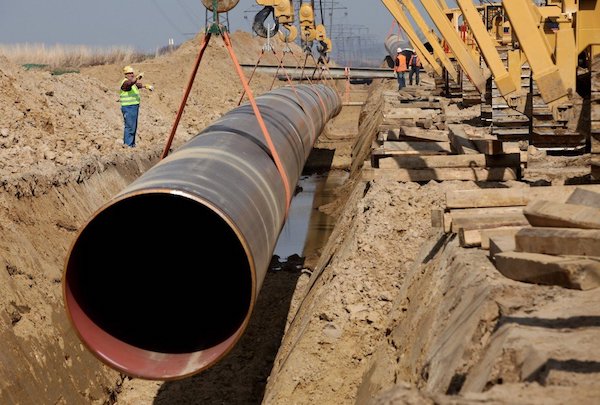
Besides direct employment from the transit economy, small-scale manufacturing and agro-based industries can potentially develop in Afghanistan given the accessibility to Southern Asian and Central Asian markets. Access to cheap energy resources and relatively cheap labor would result in the development of labor-intensive export-oriented manufacturing geared towards western and other markets.
Development is likely to be the most impressive in the border areas with Pakistan and the northern areas bordering Uzbekistan and Tajikistan, leading to better prospects of peace and stability in the region. Since the benefits of a well-developed cross-border infrastructure and improved trade regime is most likely to be felt in the border areas of Afghanistan, the population in these regions would have the most to lose from the disruption to war and strife. Thus, a successful Central Asian initiative in the medium to long-term will create a huge incentive for the local population to lend their support and sustain such agreements, thus creating a strong domestic constituency for peace and economic development.
According to Turkmen Ministry (April, 2017-18) Turkmenistan has constructed of linear part of the Turkmen section of the TAPI. Turkmennebitgazgurlyshyk has already prepared more than 6,312 meters of pipes with a diameter of 1,420 mm for welding-up of pipe sections. After laying the linear part of the gas pipeline, automation and remote control system has been introduced in the Turkmen section. This system has made it possible to carry out the management of the entire gas pipeline network from a single control point: to increase and reduce gas flows depending on export requirements.
In addition, on the route of the pipeline from the Galkynysh super-giant field till the border with Afghanistan the designers have completed a topographic survey and a complex of engineering and survey work. This will make it possible to select the best route for the gas pipeline and to determine the characteristics of the pipe used for gas transportation. Also, work continues on the analysis and the selection of equipment that must be installed on the linear part of the pipeline and its ground supporting sectors.
Finalization of Modalities
Now, all the participatory countries have agreed to proceed further and complete its mega project in 2019-2020. It has got tremendous momentum during last two years. Rigorous commercial diplomacy among all the countries has now made it reality. Its ground breaking ceremony was held last year in Turkmenistan. It has entered Afghanistan. Turkmenistan, Afghanistan, Pakistan and India (TAPI) project agreed on to invest $200 million in studies and engineering for the pipeline.
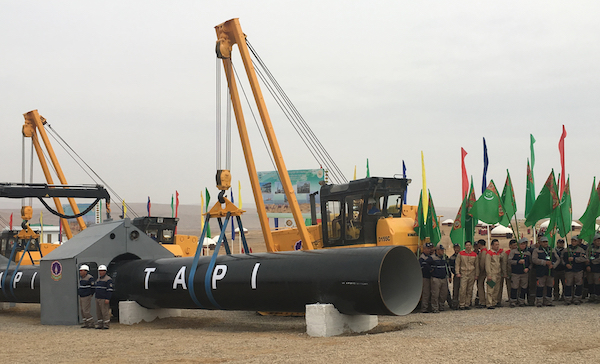
| Name of the Leaders | Strategic Vision |
| H.E. Gurbanguly Berdymukhamedov, President of Turkmenistan | TAPI is designed to become a new effective step towards the formation of the modern architecture of global energy security, a powerful driver of economic and social stability in the Asian region |
| Former Prime Minister of Pakistan | TAPI gas pipeline project will help promote peace and trade amongst the regional countries. It will help bring prosperity and peace. |
| Mohammad Hamid Ansari, Vice President of India | TAPI is a more than a project. It the first step to the unification of the region. |
| Ashraf Ghani, President of Afghanistan | TAPI demonstrates the countries’ political will. |
Asian Development Bank (ADB) Latest Assessment
Most recently, even the Asian Development Bank (ADB) termed TAPI a “doable project” which has tremendous socio-economic significance for the participatory countries as well as the region. TAPI exemplifies ADB’s key role in promoting regional cooperation and integration over the past 20 years. It will unlock economic opportunities, transform infrastructure and diversify the energy market for Turkmenistan and enhance energy security for the region.
ADB says that the $200 million investment includes funding for detailed engineering and route surveys, environmental and social safeguard studies, procurement and financing activities and to enable a final investment decision, after which construction can begin. Construction is estimated to take up to 3 years.
(b) Beginning of a New Era
TAPI gas pipeline project would be the beginning of a new era of cooperation and interconnectedness at the regional level. The project will connect Central and South Asia with each other. The launching of TAPI gas pipeline project is a revolution in energy sector.
(c) Alternative Energy Supply Source
TAPI will provide an alternative supply source of gas with dependable reserves leading to enhanced energy security. It will further diversify the fuel basket to the benefit of Pakistan and Indian economies.
(d) China’s Willingness
Most recently, China also expressed interest in becoming part of the TAPI gas pipeline project. The extension of the pipeline to China through Gwadar would give a boost to economic activities in Balochistan. The pipeline would connect a wider region if Bangladesh formally joins it.
(e) Greater Regional Pace & Prosperity
TAPI would bring regional stability that ultimately would lead to peace and prosperity. It has the potential to create a joint economic ring in the region and, in the long-term, the economic profits will guarantee regional security.
(f) Formation of New Markets & Opportunities
It provides golden economic opportunities to Pakistan, India and Afghanistan. Due to more economic opportunities, new markets will be opened for even Turkmenistan as it can extend its exports to the East where there is a remarkable demand for energy.
According to Pakistan’s government by 2050, Pakistan’s electricity requirements will grow three-fold. If sufficient resources are not allocated and utilised effectively and efficiently, the energy crisis will further aggravate. It is estimated that TAPI volume would overcome almost 70 percent of the current gas shortfall and save almost $1 billion per year by replacing liquefied fuels for power generation.
In Pakistan during the chilly winter season, the common people and industrialists faced acute shortage of gas supply. Life and machine used to come to a standstill. Keeping in view all these emerging trends/ factors, the government planned to import of gas supply from different sources and the TAPI was one of them. Gas supply in Pakistan is currently 71m cubic meters per day, which is estimated to increase by 50 per cent in the next five years. At present, Pakistan produces 4 bcfd of gas against demand for 6 bcfd.
Gas production in Pakistan is expected to increase substantially. The government is trying its level best to increase its oil and gas production. It is assumed that in the near future Pakistan will face a sever shortfall in the future despite meager gas discoveries, which would be insufficient to meet the rising demand.
TAPI: Cheapest Price
TAPI gas would be cheapest in terms of its price. Pakistan will get $250 million from India as transit fee and Afghanistan will also get the same amount from Pakistan. The agreement is between the states and the change of any government in any partner country will have no impact on the project.
The Government of Pakistan must remove all obstacles in the way of the project as it has a vital importance for the national economy in general and export-oriented industry in particular in the country. It is predicted that Pakistan’s industrial growth would certainly go up when sufficient energy would be available to keep the wheels of industry moving through TAPI.

Moreover, early execution of TAPI gas pipeline project would enhance productivity of export-based industry that would give a boost to the country’s exports. Large Scale Manufacturing (LMS) sector would be able to manage their export orders easily and earn more and more foreign exchange for the country. TAPI would be Pakistan’s largest development project.
Its early completion would also give a very good message to foreign investors. It would not only reduce tensions in South Asia but would also create employment and economic opportunities in the country. It would not only help Pakistan overcome ongoing energy crisis but would also promote political and economic interaction between Pakistan and Afghanistan who were the main stakeholders of the project.
The strategic significance of the project is huge. Once completed, TAPI can become a game changer in regional geopolitics and regional economic integration. Due to significant transit revenues if the project is completed successfully, it could bring together Pakistan’s Central Asia policy and China-Pakistan Economic Corridor (CPEC) of the Chinese ‘One Belt One Road’ project.
Pakistan’s Domestic Consumption Patterns/ Supply Channels
According to Pakistan‘s government 25 percent of gas would be fed to Sui Southern Gas Company (SSGC) and 75 percent to Sui Northern Gas Pipelines Company Limited (SNGPL) to inject it in their systems as per the decision of the ECC. TAPI project is the best manifestation of the government’s efforts to bridge supply and demand gap which had increased to around 2 bcfd.
Benefits of Pakistan
The Turkmenistan-Afghanistan-Pakistan (TAP) gas pipeline is based on mutual friendship, respect and need. It also comprises of economic prosperity, regional cooperation and above all smooth & easy availability of energy resources i.e. gas. Pakistan expects to run out of its own reserves for few years, the pipeline will help sustain growth. It helps to provide a market to Turkmenistan for its substantial gas reserves.
| Different Sectors/Sub-Sectors | Integrated Benefits |
| Industrial | It will bring Pakistan much needed energy at competitive pricing, and could easily supply about 35 percent of Pakistan’s projected needs by the time it is completed in the 2019-2020. |
| Social | It will further diversify Pakistan’s pursuits to import more and more energy resources from different countries. It will be value-addition in the country. |
| Fertilizers | It will supply interpreted energies to fertilizers in the country and ultimately increase its agriculture productivity. |
| Exports | It will definitely enhance its exports because of easy and smooth supplies of energy through TAPI. |
| Revenues | The potential extension of the pipeline to the Gwadar Port in Pakistan will also enable Pakistan to export gas to several countries, thereby increasing its share of revenue. Moreover, transit fees would also be an extra source of revenues. |
| New Job Generation | It will generate substantial new jobs in different associated sectors of the national economy in the near future. |
| Banking & Finance | It is hoped that domestic banks and financial institutes may form a consortium to invest this mega development project. |
Concluding Remarks
Turkmenistan, Afghanistan, Pakistan and India (TAPI) Gas Pipeline is the revival of ancient Silk Route in terms of regional energy connectivity. It is hoped that TAPI will provide cheap gas for Pakistan, India, transit fee for Afghanistan, and energy market to Turkmenistan, which will enhance the economic prosperity of all the countries. It is estimated that the TAPI project will reduce poverty by expanding the use of natural gas resources and enhancing sub regional economic cooperation among Turkmenistan, Afghanistan, Pakistan and India. It will generate hundreds of thousands new jobs.
It would be one of main instruments for enhancing regional stability and improving living standards in South and Central Asia. It will be a joint-giant effort in linking the energy-deficit economies of South Asia to the hydrocarbon-rich Central Asian countries. It will provide cheaper and cleaner energy to consumers which would bring greater economic prosperity and also reduce high ratios of inflation.
This project will generate incomes/revenues that can be used for developing the social sectors especially schooling, medication, clean water and housing. Turkmenistan-Afghanistan-Pakistan-India (TAPI) is a mega regional development project. It would enhance regional peace and prosperity. It would foster socio-economic prosperity. It would support dialogue and diplomacy instead of destruction in conflicts.
It upholds shared-destiny of greater economic prosperity, sustained development and resolve against all odds to achieve the desired goals of regional peace and harmony. It is hoped that on completion it will boost the countries energy security, bring economic benefits, create new jobs and provide and upgrade associated infrastructure.
TAPI is seen as an ideal opportunity to pave the way for stability in Afghanistan and could contribute to the rehabilitation of the war-torn country. It would also reduce hostile gesturing between Pakistan and India. Its implementation will also strengthen Turkmenistan’s independence, and as a result its gas supplies to world markets will significantly increase.
It is hoped that the successful implementation of the TAPI pipeline project would represent an enormous breakthrough for Turkmenistan’s capabilities as an international energy player even in South East Asian Region. It would further diversify its energy exports in the days to come.
The government of Pakistan wants its early completion. TAPI has the capacity to meet 70 percent of country’s gas shortfall. TAPI is now seen as a pipeline of friendship and greater connectivity between the Central Asian and South Asia and even between two South Asian rivals.
It is hoped that the completion of the TAPI will ensure delivery of long-term natural gas supplies to run the wheels of industries both in Pakistan and India. The pipeline will set a classic example of the regional cooperation between the two countries which are the rivals in defense but partners in economy.
TAPI is a game changer for all countries and therefore, TAPI has to be tapped and monitored continuously. Early execution of the project would help energy-starved Pakistan to overcome ongoing crisis, which is hitting the industrial sector hard. Establishment of an inter-government joint security task force (JSTF) to serve as the nucleus of the safety of the pipeline would be useful to overcome all the projected “red-lines” in the project
The project is also supported by the United States, which sees the pipeline as a part of the “New Silk Road Initiative,” which aims to integrate the region and boost its potential as a transit area between Europe and East Asia. The pipeline is also likely to spur investment in further rail and road connectivity, encourage people-to-people exchanges, enhance regional trade and economic partnerships in the region, and permanently alter the pattern of Central Asian connectivity with South Asia.
TAPI, dubbed as the ‘New Silk Route’ aims at increasing regional harmony between Central and South Asia through energy trade. The Turkmenistan, Afghanistan, Pakistan and India (TAPI) gas pipeline project will prove to be the energy silk route which will connect central and south Asia, said Dean of the Diplomatic Corps, Turkmenistan Ambassador, Atajan Movlamov.
The Turkmen Ambassador said that the Central Asian states were connected with South Asia in the ancient times through roads and that TAPI will bring about economic development, employment for the population, the development of infrastructure, multilateral security and the promotion of peace and harmony in the region. “TAPI is a key project which will lead to peace in the region as it will boost security cooperation among member countries,” the ambassador said. He said the landmark energy project will also open avenues for generating economic activities, helping people raise their standards of living. The ambassador said the project will connect the energy-rich central Asian states with the south Asian countries with 1,840km of gas pipes. Furthermore, the project will be implemented in two phases and after it is completed, up to 33 billion cubic metres of natural gas will be exported per year for 30 years.
The pipeline offers a win-win scenario for all participating states: Turkmenistan will diversify its exports, Afghanistan will benefit from increased investments and employment, as well as from transit fees (estimated at around US$400-500 million) India and Pakistan will benefit from a new supply route enabling them to meet growing demand for energy. At regional level, TAPI will bring greater integration, both economic and political.
TAPI can be traced back to March 1995, when Turkmenistan and Pakistan signed a Memorandum of Understanding (MOU) in Islamabad on the construction of a Trans-Afghanistan pipeline between the two countries; this was followed by talks between Turkmenistan, Pakistan and the former Taliban regime of Afghanistan. Initially, Argentinian oil and gas company Bridas and US company UNOCAL competed for the right to develop the proposed project. Eventually, UNOCAL and Saudi Arabian company Delta formed a consortium; Russian gas producer Gazprom also had a 10 % share but subsequently withdrew. This first attempt to build the pipeline failed when consortium leader Unocal withdrew from the project following the August 1998 bombings of the US embassies in Kenya and Tanzania by Al-Qaida. The proposal for a pipeline to transport Turkmen gas to Pakistan via Afghanistan was revived after the 2001 war in Afghanistan overthrew the Taliban regime, with the Afghan interim government expressing enthusiasm for the project and promising to guarantee its security. In May 2002, the leaders of Turkmenistan, Pakistan and Afghanistan signed a memorandum of understanding on the construction of the pipeline.
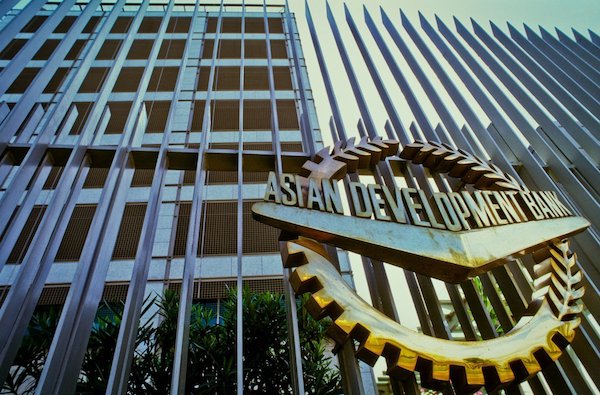
Following the memorandum, a steering committee comprising the energy ministers of the participating countries was formed to follow up the project. At its first meeting, in July 2002, the committee asked the Asian Development Bank (ADB) to provide technical assistance (TA) for project feasibility studies. In December 2002, the ADB concluded its first TA report, opening the door to a December 2002 agreement between the three leaders to set up a consortium to build and operate the Turkmenistan-Afghanistan-Pakistan (TAP) pipeline. Since the participation of India was not certain at that time, the capacity of the pipeline was envisaged at 20 bcm per year.
The ADB proposed two alternative routes, each with a planned length of about 1 700 km and an estimated cost of US$2-2.5 billion. India initially appeared reluctant to join the TAP as it was also working on competing gas pipeline projects, particularly the Iran-Pakistan-India (IPI) pipeline, which was opposed by the United States on the grounds of sanctions against Iran. However, Indian officials participated in the TAP steering committee meeting for the first time in February 2006 and the Indian government approved the country’s joining the TAP project in May 2006.
On 24 April 2008, the four participating governments initialed a gas pipeline framework agreement and India became a fully-fledged partner in the project, now renamed TAPI. India’s involvement accelerated progress towards implementation. A major step towards implementing TAPI came in December 2010, when the four countries signed a gas pipeline framework agreement, an inter-governmental agreement, and a heads of agreement relating to the gas sales and purchase agreement (GSPA), marking the completion of Phase 1 of the project.
Turkmenistan’s national oil company Turkmengas signed GSPAs with India’s state- controlled GAIL and Pakistan’s Inter State Gas System Ltd, the main transmission system operators in their respective countries. This step, described as ‘historic’ by the ADB, sparked hopes of rapid implementation. Afghanistan’s state gas corporation (Afghan Gas Enterprise) followed suit by signing an agreement with Turkmengaz in July 2013, thus finalising Phase 2 of the project.
Phase 3 of the project involved setting up a special purpose consortium company (SPCC), selecting the consortium leader and finalising GSPA-related operational agreements. In November 2014, the state gas companies of the four partner countries established the TAPI Pipeline Company Limited (TPCL), which will build, own and operate the pipeline. In August 2015, Turkmengaz was approved as the consortium leader of the SPCC. Shareholders of TPCL signed a shareholders agreement on 13 December 2015 at the ground-breaking ceremony held in Turkmenistan’s Mary province, attended by the Turkmen president, Gurbanguly Berdimuhamedov, the Afghan president, Ashraf Ghani, Pakistani former prime minister, Nawaz Sharif, and the Indian vice-president, Hamid Ansari. The long-delayed inauguration of construction is a milestone in the project and also marks the beginning of Phase 4, which is expected to take about four years. Construction works led by Turkmengaz are progressing according to schedule. Although there are still many concerns about the viability of the project, the expected benefits of TAPI, outlined below, are likely to encourage participants to maintain this progress.
Fast economic growth has fuelled rising energy demand in India and Pakistan, even causing acute power shortages in these countries. This has forced them to look for new gas suppliers, at the same time as Turkmenistan seeks to diversify its export destinations. Energy integration and cooperation between the two sides has therefore become increasingly important and mutually beneficial.
The pipeline will also have still wider economic and social consequences. The Ashgabat government has announced that it would also finance a new high-voltage transmission power line and extend a railway from Turkmenistan to the border of Afghanistan. The power line will bring 500 kW of power to Afghanistan and the Turkmen government will cover the cost of the 13 km rail project, estimated at $1.5 million.
In addition to these numerous economic opportunities, plans are to have it built along the Kandahar-Herat Highway, where a fiber optic cable will be laid that will newly provide access to the Internet to many thousands in rural areas. A successful TAPI also has the potential to ease Afghanistan’s domestic security tensions and strengthen foreign relations with its neighboring countries.
The Turkmenistan-Afghanistan-Pakistan-India (TAPI) gas pipeline project which is an integral part of global energy domain and of historic relevance can create economic integration in the South and Central Asian region. The inauguration ceremony for the construction of Turkmenistan-Afghanistan-Pakistan-India scheduled to be held on 23 February, 2018 in Herat would be a remarkable moment to usher energy security, peace and bringing nations closer. The commencement of TAPI work in Afghanistan can culminate yesterday’s vision into reality to bring prosperity and more importantly peace in the region which the country is longing for since the invasion and liberation of Afghanistan. The Central and South Asia has witnessed a series of noteworthy geo-economic shifts and the TAPI project hopes to create tremendous opportunities and to be a game changer in the years to come. South and Central Asia can be ‘Global Land Bridge’ and ‘Epicenter of global economic activity’ with gigantic strides for the economic development in the region. South and Central Asia can be ‘Global Land Bridge’ and ‘Epicenter of global economic activity’ with gigantic strides for the economic development in the region. TAPI is expected to give biggest potential boost on regional economic growth, job creation and revenue generation. TAPI has created a momentum for the development and growth of Central and South Asia.


